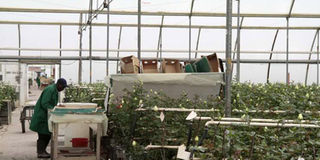We will take action on rogue flower farms, union says after NTV exposé

A worker inside a greenhouse at a flower farm in Naivasha. PHOTO | SULEIMAN MBATIAH | NATION MEDIA GROUP
What you need to know:
- Workers interviewed in the documentary claimed they had been evicted from their houses due to delayed salaries.
They had also been on strike due to non-implementation of laws meant to protect them.
The report further claimed the workers had been denied maternity leave and further complained of working for a long time before they are employed on permanent terms.
An investigative story by NTV on the sorry state of affairs on Naivasha flower farms has jolted union officials in the sector.
Kenya Plantation and Agricultural Workers Union (KPAWU) officials now say the affected firms have violated their Collective Bargaining Agreement, a matter that they are investigating.
They also poked holes in the report dubbed ‘No bed of roses’, which aired on Sunday, saying that they were never interviewed to tell Kenyans the truth about the reality on the ground.
DELAYED SALARIES
Addressing reporters at KPAWU offices in Nakuru town yesterday, deputy secretary-general Thomas Kipkemboi said flower growers under the Agricultural Employers Association and KPAWU have a valid, recognised agreement and recently signed a CBA.
“The CBA we signed covered terms and conditions of employment effective from August 1 and it will last two years where we are supposed to negotiate again. The issues mentioned by the human rights commission programme adviser have been taken care of in the CBA. If the report by NTV is true, then the affected farms have violated the CBA and KPAWU is ready to launch investigations into this matter and address it,” said Mr Kipkemboi.
Workers interviewed in the documentary claimed they had been evicted from their houses due to delayed salaries.
They had also been on strike due to non-implementation of laws meant to protect them. The report further claimed the workers had been denied maternity leave and further complained of working for a long time before they are employed on permanent terms.
ANNUAL LEAVE
“We have a clause in the CBA that clearly states that workers are only supposed to work for three to six months before they are employed permanently.”
KPAWU national organising secretary Henry Omasire refuted allegations that the union was not doing anything to address the plight of workers in the flower sector.
“We have a CBA that serves employees for two years. The flower sector in this CBA has a clause on maternity, which is clear on how mothers are treated. They are given an hour a day to go and breastfeed. They are also supposed to be given light duties every now and again for three months. They are allowed to enjoy annual leave for that particular year,” he said.
“We categorically condemn that wrong statement by the Human Rights Commission,” he added.
Assistant organising secretary Benard Ochanda said the union was keenly following the matter because of the grave allegations.
SPECIFIC FARMS
“The union works through the CBA and it is what binds us with the employees. There is no way a clause will be violated and then we sit back and watch. All the four issues raised in that report are catered for in our CBA. The employers also have their group, the AEA and whenever we are bargaining, we must agree with the directors of various companies,” he said.
Mr Ochanda, who claimed to have worked in the flower farms for long, said there was no way a pregnant mother supposed to go on maternity leave would be denied that chance.
“I am a product of flower farms, which have been having their own CBA apart from this one with the AEA. There is no way that a mother who is pregnant and supposed to go on maternity leave will be dismissed. Even if someone has worked overtime, he must be compensated. So the information by the human rights body was a distortion of facts,” added Mr Ochanda.
The union’s Naivasha branch secretary Ferdinand Juma asked the rights commission to point out the specific farms that they think are violating the workers’ rights.
“Why don’t they come to us and identify the firms they claimed to be violating the rights if they want to help these people?” he posed.





